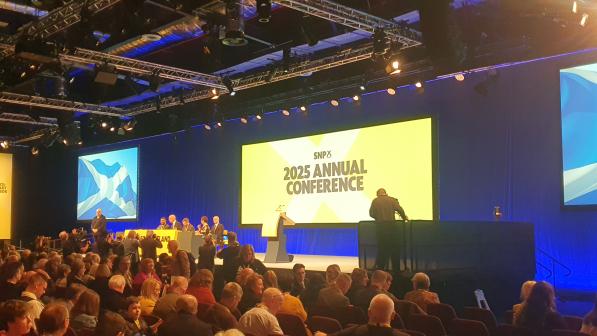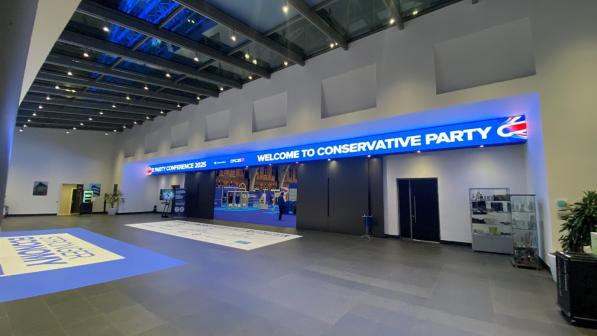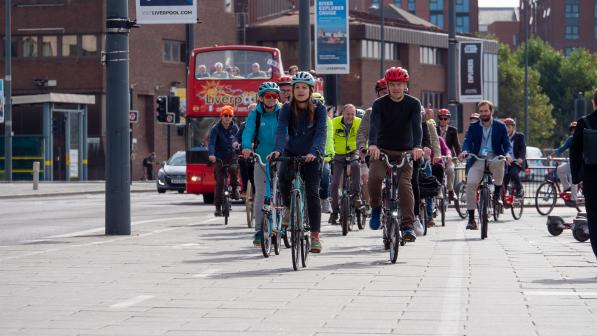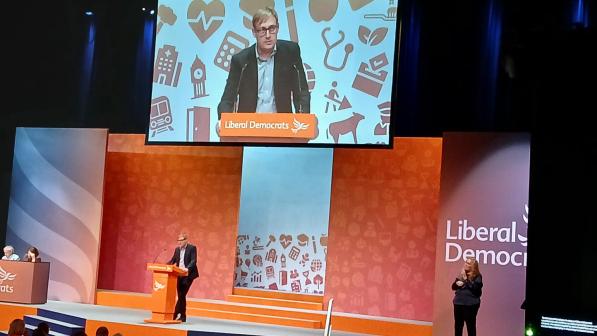Green Party autumn conference 2025: The left can do populism too

As Storm Amy buffeted coasts around the country a wind of change was blowing through Bournemouth as a reinvigorated Green Party came to town for its annual conference.
Billed as its “biggest and buzziest” gathering yet, and with Green Party membership now surpassing the Liberal Democrats at around 60,000, the event buzzed with energy from more than 1,000 attendees.
New leader Zack Polanski, elected just weeks earlier with 85% of the vote, set the tone: this was no quiet policy huddle, but a fiery declaration of war on inequality, climate inaction, and a “political class poisoned by extreme wealth”.
A Green future
At times the conference had the air of an old-time revivalist rally for the faithful and new converts alike. In a post-election landscape where Labour's cautious centrism leaves the left hungry for alternatives, the Greens positioned themselves as the unapologetic future: taxing the rich, nationalising essentials and welcoming refugees.
The conference kicked off on Friday (3 October) amid a palpable sense of momentum. Membership had surged by 20,000 in recent months, fuelled by Polanski’s media-savvy charisma and dissatisfaction with Keir Starmer’s government.
Sessions blended policy workshops, fringe debates and committee elections, but the spotlight fell on leadership speeches. There was little about transport, let alone active travel – this was a weekend of broad, bold, internationalist brush strokes.
Polanski, a former actor turned activist, took the stage first, delivering a 20-minute barnburner that earned standing ovations and chants of “Tax the rich!” His core message? We’re living in “rip-off Britain,” where rough sleeping has spiked 164% since 2010, renters teeter on eviction’s edge and water companies dump sewage while hiking bills.

“We will break the shackles of poverty and hardship,” he thundered, pledging to “end rip-off Britain” by taxing the assets of the top 1% – not plumbers or hairdressers, but those who “wake up richer without lifting a finger”.
Polanski didn't mince words on Labour, accusing Starmer of being the “handmaiden” to Reform UK’s “dangerous” politics, potentially handing the country “on a plate” to Nigel Farage. He mocked Starmer’s dismissal of wealth taxes as a panacea, insisting the Greens’ version funds universal childcare, SEND education, rural buses and climate action.
Environmentally, Polanski touched on “clean rivers” and renewables, but the speech pivoted hard to economic justice: nationalising rail, energy and water to slash household bills by £250 annually, the “privatisation premium”.
“Our message is clear: we will bring down your bills, cut the cost of living, and protect our NHS,” he repeated, a mantra echoed in viral clips across social media.
Rights reforms
Co-deputy leaders Mothin Ali and Rachel Millward followed, amplifying the populist pitch positioning the Greens as the true left-wing force, urging members: “We’re the future – don’t wait around for Corbyn and Sultana.”
Millward, focusing on housing, vowed renters’ rights reforms and effectively abolishing private landlordism through council housing booms and rent controls. Her speech drew multiple standing ovations, underscoring internal polls showing strong member support for bold economics over pure environmentalism.
Policy debates revealed the party’s grassroots dynamism. Motions passed to decriminalise all drugs – a controversial push beyond cannabis reform – and expand green infrastructure like carbon capture and closed-loop systems.

Immigration took centre stage, with Polanski declaring “refugees welcome” and critiquing Labour’s “timid half-measures”. Fringe events also often had an internationalist theme, although one on a ‘nature revolution’ gave a nod to access to nature and green spaces – a forthcoming campaign theme for Cycling UK.
Saturday’s plenary hammered home electoral ambitions. With mayoral races looming – aiming for Hackney’s first Green win –and local elections in 2026, Polanski rallied: “We’re campaigning to win more seats in more places than ever before.”
New CEO Harriet Lamb and Wales Green Party leader Anthony Slaughter joined speeches on international solidarity and domestic renewal. Committee elections filled roles in campaigns, equalities and international affairs, ensuring member-led governance.
Seize the moment
By Sunday, as delegates departed, the conference had voted on dozens of motions, from anti-fracking reinforcements to SEND funding hikes. Polanski’s closing words – “The Green Party’s moment is now. We are ready... let’s go!” – left no doubt: this was a pivot from protest to power.
The Greens felt unstoppable. With Polanski now featuring in the TIME100 list as “influential”, the party’s voice seems amplified as never before.
As Britain grapples with post-Brexit woes, climate crises and inequality, the Greens’ 2025 conference wasn’t just a meeting: it was a manifesto for reclaiming the radical heart of British politics and setting an optimistic (if not utopian) vision of what the nation could be.
As the party takes its message from the friendly conference hall to a more pessimistic public they will need to articulate an answer to the sceptic’s question: ‘Yes, but how?’



